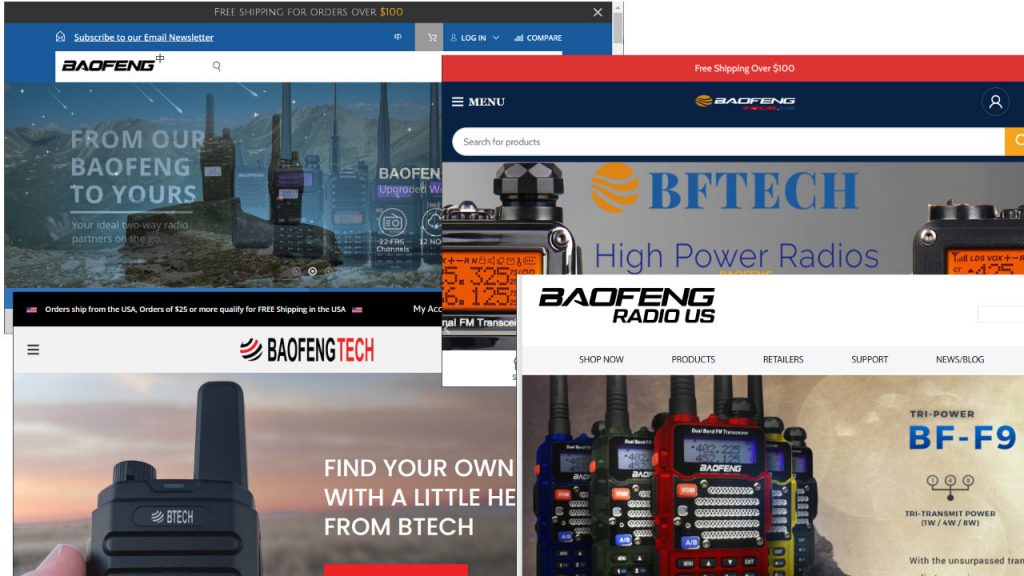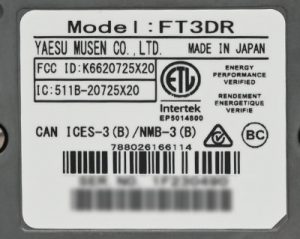Everywhere you look today there are Baofeng radios with different labels, different model numbers, and slightly different names. Will the real Baofeng please stand up? Probably not, and here is why.

Let me start by trying to figure out what or who Baofeng is, exactly. This might be difficult since there is BaofengRadio.com, BaofengTech.com, BaofengTech.us, BaofengRadio.us, and many more. Each seems to have its own unique branding and they share some models while offering different ones.
I am by no means an international business or law expert, so take all of this with a healthy dose of salt.
We all know that China has a habit of “acquiring” or reverse engineering items and making cheaper versions of them. What may surprise you to know is that China has the same problem itself. Once an item is made and it looks to be successful, it seems that others both inside and outside of China have no problem acquiring that design and building it with a new name on it.
As best as I can determine the original, and real, Baofeng is Baofeng Electronic Co., Ltd located in Changfu Industrial Zone, Xiamei Town, Nanan, Quanzhou City, Fujian, China. I believe this because their websites, BaofengRadio.com and BaofengRadio.co have the most extensive company information, the most history which appears to agree with other authoritative websites, and their name is listed in many legal company databases in China predating other potentially fake Baofeng radio companies.
But here is the question, does your Baofeng radio have to be manufactured by Baofeng Electronic Co., Ltd in order to be a real Baofeng? Let’s think about this for a minute.
Let us say we have a known fake Baofeng, we will just call it the fake. The fake is probably built from the same schematics using most if not all of the same electronics, probably even using the same plastics sourced from the same manufacturer. It is even possible that some of the same people were involved in making the fake as a real Baofeng. Heck, it was probably shipped on the same ship through the same port and could be sold in the same stores.
I have to be honest here, I am one of those people who believe that just because two things come from the same basic design and even are made on the same assembly line by the same people in the same factory does not make them equal. Different quality of parts could be used, different types of adhesives, different quality control standards, etc.
To me this means that I absolutely think that there is a “real Baofeng”, and a “fake Baofeng”, but that also does not mean that the fake is not as good as the real, or even better.
One thing is for sure, there are a lot of people selling Baofeng radios and I would say from what I have seen that very few of them are actually manufactured and sold to the consumer by Baofeng Electronic Co., Ltd in Changfu Industrial Zone, Xiamei Town, Nanan, Quanzhou City, Fujian, China. In other words, there are a lot of fake Baofeng radios out there.
That’s right, the majority of radios sold online including from places such as eBay and Amazon are all “fake”. In fact, I am pretty sure that almost every Baofeng radio I have reviewed on this website is not a “real” Baofeng.
So why do people sell and review fake Baofengs?
That is an easy question! I review the radios that people like you are most likely to end up looking at. It doesn’t do either of us any good for me to review real Baofeng radios if you never actually get your hands on one.
Most sellers don’t really know who the real Baofeng is, nor do they care, what they care about is making money. They buy product xxx and sell product xxx. If they make a profit factoring in returns etc, then they keep selling xxx.
The end user doesn’t really care if you are honest about it. What you want is a radio that does a certain job and you want it for as little money as you can get away with paying. Why buy a $500 Kenwood when a $30 Baofeng does what you want? That same logic works with the question “why buy a real Baofeng for $50 when a $30 knockoff will do the job I need?” Heck, it even looks the same!
Yes, there are some serious differences between cheap radios and expensive radios. That applies to most things in life. When I was turning wrenches for a living (being an automotive mechanic) I understood all too well why I paid hundreds of dollars for a small open-end wrench set from Snap-On instead of $99 for the big Craftsman set I used before becoming a “real” mechanic. Today I know exactly why I use Makita power tools instead of Ryobi. For some jobs, I go to Harbor Freight for tools, and for some jobs, I do not. If you don’t understand the difference, then it probably won’t matter for your needs.
Truth be told, in regards to radios, for the vast majority of people buying the fake Baofeng radios, they wouldn’t know the difference between a Baofeng UV-5R and a Yaesu 4XR other than looks, and they don’t need to.
What about FCC certification and licensing on fake Baofengs?
An FCC certification means that the radio passes some tests to make sure it does not interfere with other equipment, among other things. Every radio that transmits should have an FCC certification. Many do. Every radio by the big companies like Kenwood, Yaesu, Alinco, and Icom, are all FCC certified.

The fake Baofeng radios usually either do not display a certification sticker at all (usually on the back under the battery), the sticker is also fake, or the radio received an FCC certification and was subsequently modified to do things it should not be able to do.
I used to be one of those who really went off on the whole “It must be FCC certified! You must be licensed! You must not ever violate the FCC rules!” and while I still believe and practice that, I am not so adamant about yelling at people about it.
My reasons are simple in that today I honestly believe the majority of people on the amateur radio waves are not licensed and are using equipment that probably is not really certified so getting all snotty about it isn’t going to get me anywhere. I have to accept that this is just the way things are today.
What do I base my assumptions on? My experiences.
Just the other day I was in a Mexican restaurant in New Mexico on a trip my wife and I were taking. I noticed that all the employees were wearing radios with earpieces. I immediately recognized the radios as Baofeng BF-888s models (probably fake Baofeng 888s, but still). There is no way you will get me to believe that all of those people were licensed (commercially as amateurs can’t use it for work), that the radios had been reprogrammed (I know what frequencies the 888s uses by default and they are quite illegal) and that somehow, magically, the 888s had been FCC certified for business bands while I was sleeping.
How about the school district outside of Buffalo Texas that uses Retevis radios? I know the IT guy, he couldn’t program the radio to a legal frequency with a gun to his head. No, they were not FRS legal, and no, the school does not have a license.
Those are two examples of what I see all the time. Radios are cheap and can be bought off eBay and Amazon with no checks or verifications of any kind. People buy them and use them like there are no laws. That is unlikely to change so I am not going to get worked up about it. Yes, I believe radios you use should be certified (and mine are), and yes, you should be licensed for the bands you use (I am). Anything else is irresponsible, illegal, and potentially dangerous.
Yes, I believe that real Baofeng radios are FCC certified for amateur radio use. No, I do not believe the fakes are. Just look at when the FCC cited Amcrest Industries in Houston, Texas which runs BaofengRadio.us for illegally marketing UV-5R radios “capable of operating outside the scope of its equipment authorization”.
My conclusions on fake Baofeng radios
In the end, Baofeng radios are the most copied (or pirated/faked/whatever term you choose) radio out there because they are cheap, easy to manufacture and sell like hotcakes. The way to stop the fakes is to quit buying them. If everyone bought Yaesu, Kenwood, Alinco, Icom, etc, and not Baofengs then the motive would not be there to fake them. Even if people would research to find out who the real Baofeng is before purchasing instead of just going by price, this wouldn’t happen. So yeah, it is the consumer’s fault this is happening. Your fault, my fault, our fault.
That is okay though, we get what we pay for. The $30 Baofeng is just that, a cheap, disposable radio for people to learn on and abuse. If, or should I say when, it breaks, drop it in the trash bin and buy another one.
So I will continue to review and talk about radios I know are not real Baofeng radios because you will keep buying them. I see my job as helping you pick the best radio and accessories for your needs, from what you have available to you, which is mostly fake Baofeng radios.
73s

